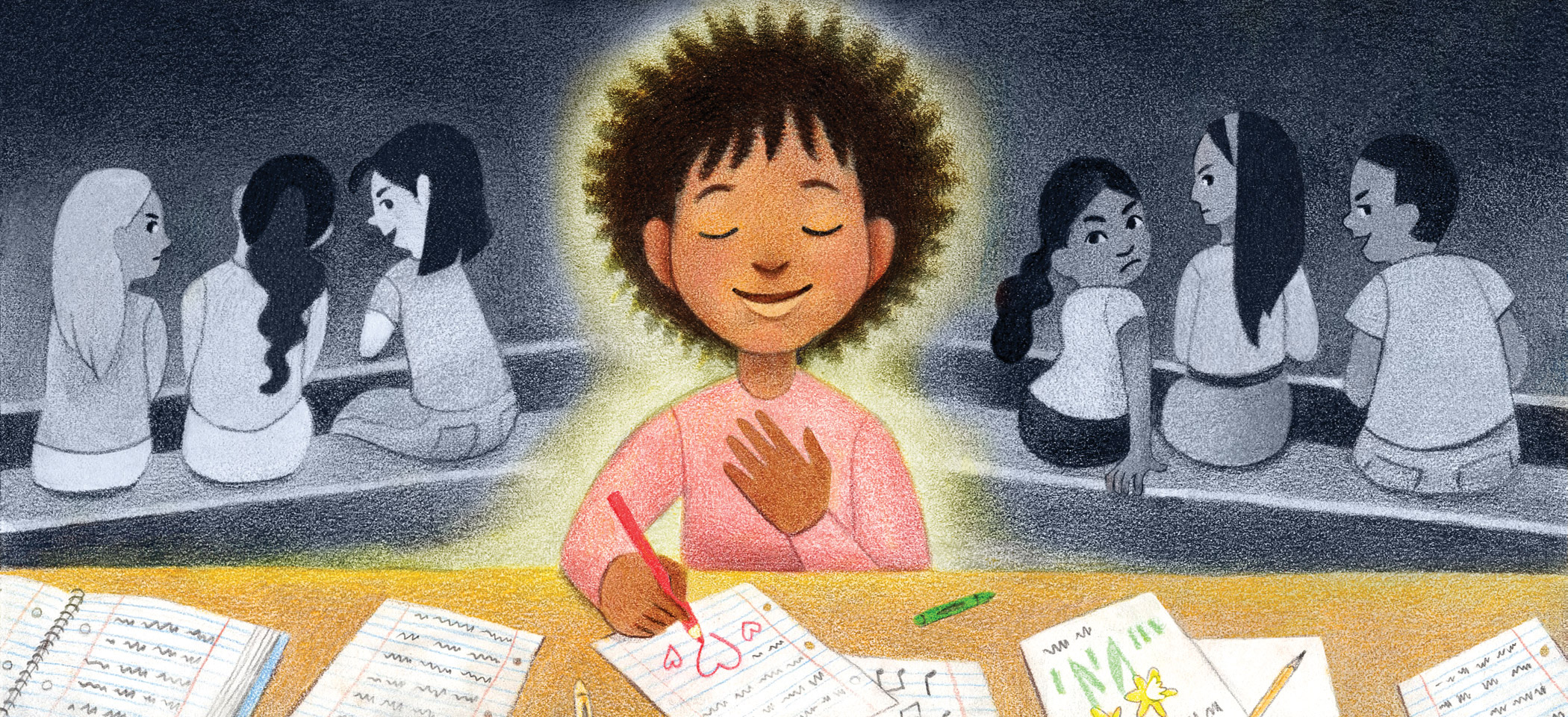Illustration by Heather Franzen Rutten
Second Act
essay by Angela A. Bey
The 100-year-old brownstone of John M. Patterson Elementary School in Philadelphia held my first-grade classroom. I remember everything vividly—dried-up Crayola markers, paint-chipped walls and photocopies of “Hooked on Phonics” workbook pages.
My peers walked in close-knit groups down the halls, and certain lunch tables were off limits to me. We were all from the same neighborhood, but I talked “too white,” my hair was “too nappy” and I cried “too much” for their liking. Before long I grew uncomfortable with myself, too. This ascribed identity pervaded every aspect of my life. I grew quiet—very quiet—and went days without saying anything at all.
My first-grade teacher, Mrs. D.W., helped me find my voice through creative writing.
One day, she handed me paper and a pen. “Homework,” she said. “Write down what you’re feeling and bring it to class on Monday—anything you want.”
I found myself completing D.W.’s assignment a thousand times over—between classes, at recess, after school. I wrote about streetlamps, my favorite corner store and dandelions in the summer—anything I wanted, just like she said.
Before long, my interests expanded. I wondered how my stories would sound to music, if dialogue could be spoken onstage, if the rhythm of language could inspire bodies to move. However, Patterson Elementary did not have a performing arts program, so when I told D.W., she simply said to “Keep creating!”—and so I did.
At the end of the year, she notified my parents of Philadelphia Performing Arts Charter School. It was relatively new, but had better academics and resources than Patterson and a brilliant performing arts program. After a short conversation, my sister and I were placed in a lottery for that fall.
For two months, we raced to the mailbox every morning and dreamed aloud at the dinner table every night. By the time a letter came in the mail, I’d written several fairy tales about my new school. Only, the letter was not for me; it was my little sister’s. I was devastated.
My parents did not give up. Immediately, they collected my stories and scheduled a meeting with the principal; Mrs. D.W. was there, too. At the end of a short conference, I was enrolled.
PPACS was everything I imagined and more. My classmates welcomed me with open arms. We danced ballet, learned French and sang in choir. I also continued my passion for creative writing. PPACS’ arts education was invaluable. It equipped me with a unique skill set that will help me pursue fields in and outside of the arts.
I think back to who I was years ago and recognize that I am not alone. Plenty of students are told they are insufficient and may not have someone like Mrs. D.W.—or arts programs—to show them otherwise. A student’s worth should never be defined by the scores of their tests or the size of their group of friends. A person should be able to express themselves through multiple outlets and be valued for the diversity of their mind and talent. To think otherwise eliminates and excludes voices that are integral to the fabric of our society.
I was convinced I did not matter. Arts education made me think otherwise. Unfiltered, honest outlets for kids are vital, and it’s what the performing and creative arts offer. Every voice is a thread that binds the delicate fabric of our society. Now more than ever, we cannot drop stitches or cut corners.
Angela Antoinette Bey is a playwright, performer and student at Ursinus College. For more information, please visit angelabey.com.



